Overthinking It is celebrating our nation by searching for the most American piece of pop culture with the word “American” in the title. Read the entire series here.

rom the day Rip Van Winkle returned from bowling with gnomes to meet his adult daughter, the ‘Merican Family has been in crisis. From the waves of Communists desperate to destroy it to the waves of immigrants desperate to build it, perils real or imagined have confounded it and created it. From the Little House on the Prairie to House of Big Momma, love, faith, sacrifice and a special sort of delusion have granted the strength to protect it. Through it all, a people constantly moving for opportunity, freedom, safety, work, and affordable real estate have built a creed around the precious, certain and unsurpassable goodness of staying together in one place. To many, ‘Merica is the ‘Merican family.
And for family, ‘Merica, goes nuclear. One dad, one mom, one sister, one brother, and maybe a dog, with slight variations. Despite the trails of tears, slave auctions and dust bowls tearing us asunder for hundreds of years, the nuclear family remains a frequently identified foundation of ‘Merica, even as it changes into something very different. For perhaps its final hurrah, I have dedicated each of the four matchups to a different member of that hallowed and hounded institution.
Without further delay, standing astride this widening chasm like sweating colossi, are the eight most ‘Merican pieces of pop culture about family, brought to you nuclear style.
The Father’s Match: American Beauty vs American Chopper
The ‘Merican Nuclear Father is obsessed with his fading vigor and authority. Sexual and financial, physical and emotional, subspecies pater’mericas swims in bathos and pathos, grinding his hopeless and tragic way through shattered power fantasies toward the lion’s share of financial and critical rewards. Few titans of pop culture have racked up more of that ironic validation for tortured inadequacy than that bag-waving Sam Mendes joint, American Beauty, and it’s our top seed in the family bracket.
Kevin Spacey, Annette Bening and their dreams-gone-wrong are up against a dark horse (but on a steel horse it rides) the Discovery Channel’s most richly mustachioed reality offering, American Chopper. It looks like a show about motorcycles where a father and son argue a lot, but turns out to be a show about a father and son arguing a lot that happens to have motorcycles in it.
Beauty brings enough ‘MNF-ish psychosexual longing to fill the station wagon. Family life in Beauty is an unfortunate and miserable delay between “right now” and “boning someone you can’t but must have.” Not deserving its reputation for over-seriousness, the satire quivers at such transgressive suburban demons as “working in fast food” and “buying a Pontiac” before descending into homophobic murder, stripping naked for the guy who designed the Hunger Games, and riding Peter Gallagher like a mechanical bull, not necessarily in that order.

Beauty trades in “You think suburban families ought to be so happy, but deep inside all these prosperous people are so miserable.” It may be one of the most tired and overrated “insights” in popular culture, but you can’t deny its ‘Merican pride of place.
To its credit, Chopper doesn’t bother with delusions of idyll. Nobody gets along, although somehow everybody gets on (for a while, at least). In many ways, it’s the the more honest, more textured, and more profound exploration of family. Compare these two long dark nights of the Fatherly soul, first from Beauty:
I am 42 years old; in less than a year I will be dead. Of course I don’t know that yet, and in a way, I am dead already.
– Lester Burnham
And then from Chopper:
Tomorrow I’m going to have to face my biggest nightmare, and that’s the dentist.
– Paul Teutel, Sr.
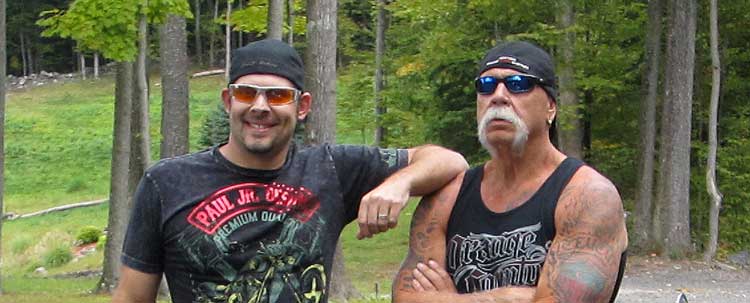
American Beauty almost dropped this one and is looking shaky going into the rest of the tournament. The movie is so busy showing us how frustrated everyone is in their families that they don’t bother showing them participating in them. Meanwhile, American Chopper scores points for authenticity and then gives them right back with not particularly engaging segments about the custom motorcycle business. But in the end, Paul Teutel, Sr. kicked Paul Teutel Jr. out of his shop, then brought him back to the show, and then started over again without his son at all, on Country Music Television.
And it’s that last part ‘Merican Nuclear Father can’t abide. If you go on Country Music Television, even if you hate him, you bring your son.
Winner: American Beauty
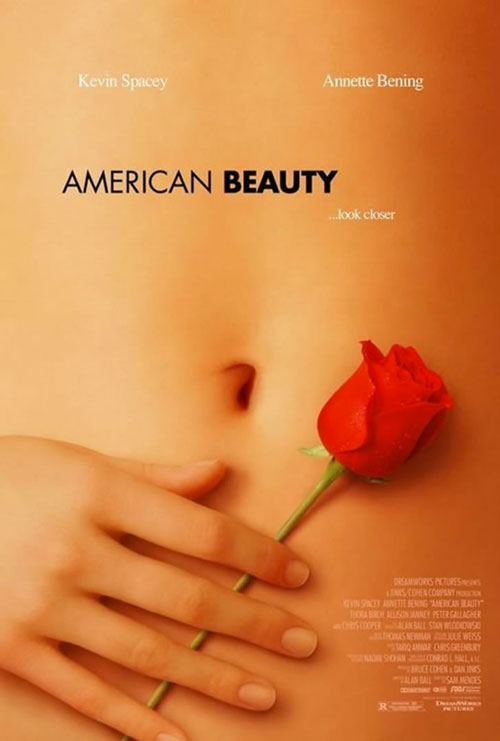
The Mother’s Match: An American Tail vs How to Make An American Quilt
The ‘Merican Nuclear Mother is a creature of infinite sacrifice: It is not about her, it is about the children. Historically deprived of participation in the ‘Merican Fatherly sphere, which includes career, power, war, heroism, drinking, smoking, enjoying yourself in leisure time, and violating people’s constitutional rights while getting results, the ‘Merican Nuclear Mother instead invests her strength (and her superior but underpaid intelligence) in the future. She is most fulfilled in the moment of revelation when her children, departed into independence, turn back and acknowledge everything that family has meant to them.
How to Make an American Quilt appears a formidable contender, with a legendary-female-driven cast so stacked it bordered on madness (Maya Angelou in a Wynona Rider movie? The actual, Honest-to-God Anne Bancroft? Half the cast of My So Called Life in cameos? Dermot Mulroney doesn’t even make the billing in the top 9?), and a promised tone of deep, contemplative revelation.
Don Bluth’s An American Tail is among ‘Merica’s greatest non-Disney/Pixar animated children’s classics, with a legendary-female-driven pop single, sung by, among others, the peerless Linda Rondstadt.
Both movies are produced by Amblin Entertainment and birthed in the Spielberg Extended Universe. Quilt featured Spielberg’s wife, Kate Capshaw, and Tail inspired Spielberg to found the studio that would eventually give us Shrek (You’re welcome, ‘Merica.). Nine years apart in time, not so far apart in agency. So you think they might be evenly matched.
But dig into both movies, and the differences shake out quickly.
Quilt is a film made to be respected. It revolves around a graduate student continually changing the topic of her masters thesis on the eve of her wedding, and goes on to show the pains, loves, joys and sorrows of an older generation of women. Most involve private angst, frustration, and forbidden love affairs kept secret due to social pressures, given new life through storytelling and stitched into the eponymous duvet.
It is plagued by regret and sadness. It is deeply uncomfortable to watch with anybody who has gone through any of the painful scenarios it details. Since it strives to represent a broad range of ‘Merican experiences (and the many ways they despair), this means it is a private movie, not good to watch with other ‘Mericans.

The most ‘Merican thing in the movie is how all the sorrows of all these women are woven together into the quilt that is given to Wynona Rider to take home to married life. The ‘Merican Nuclear Mother appreciates that her adult child has come to regard and incorporate the lessons of her pain, love and loss into a bright new future.
Least ‘Merican is the parade of pain, humiliation and regret of the ‘Merican Nuclear Mother, all now aired in public.
This is not to say it’s bad to her – Quilt is a dagger striking at dehumanizing ‘Merican standards for how women keep quiet about their lives and histories. But there’s a cruelty to it disguised as dignity. If these are truly things that these ‘Merican Mothers usually don’t want to talk about, spending all our time talking about them is not ‘Merican.
And there are other movies that manage this publicizing of the private and this empowerment by maintaining, in their defiance, a ‘Merican spirit (The superior If These Walls Could Talk comes to mind). ‘Merica is more than a subject of criticism or satire in Quilt, it’s a sneering villain, an amorphous space of pain. Perhaps they tipped their hand in this by making the protagonist a Berkeley graduate student.
‘Merica is also something of a villain in Tail: a broken promise of safety for Jewish refugees fleeing religious persecution and ethnic cleansing. A sentimental pastiche of Ellis Island-era lore and symbol, Tail does something Quilt does – shatter the expectation of safety and happiness in the American family – but then does something Quilt might imply it does, but does not: stitch it back together again.
While Tail follows Fievel Mousekewitz and his sister Tanya on new adventures with new friends, the central conflict of the movie is that the Mousekewitz family, which left Eastern Europe to survive as a unit, is scattered in New York City, unable to find each other.

Every ‘Merican Nuclear Mother who has watched a child grow up and leave can connect with the yearning of separation in Tail (and the joy of reunification), despite the suffering, despite the hazards, despite the giant cat-battling steampunk automata. And it touches the ‘MNM’s heart all the more that the children miss and seek out each other and their parents; it’s not just the parents missing the children.
That’s the carrying forward – the continuation of ‘Merimaternal love – not just seeing your children understand your sadness the way you understand it, but seeing your children love each other the way you love them.
Watch and weep with joy, ‘Merica.
In pop culture, it no longer novel to say that sometimes ‘Merican family sucks, or sometimes it disappoints, or that the dream isn’t all it’s cracked up to be. ‘Mericans know that already. ‘Merican families are a huge pain sometimes, and yet people still want them and try for them an awful lot. If you don’t somehow capture that yearning, I don’t see you going far in the competition. But time will tell.
Winner: An American Tail
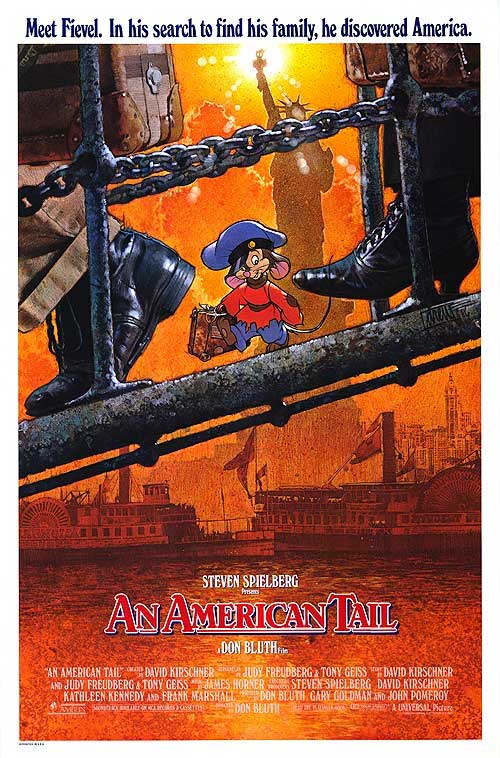
The Sister’s Match: The Americans vs Kit Kittredge: An American Girl
The ‘Merican Nuclear Sister is a question, wrapped in a mystery, inside an overly restrictive gender role: “What will she become?”
The imperative of girls in ‘Merican pop culture is to transform, with the different axes of transformation in constant conflict with each other. There’s:
- The sociological: Girl becomes woman.
- The aspirational: Girl becomes astronaut.
- The complex: Girl becomes woman and astronaut.
- The unfortunate: Girl becomes sexy astronaut.
And a ‘Merican Nuclear Sister’s story places this transformation in symbiosis with family, showing how family guides and restricts the girl’s transformation, and how the girl’s transformation guides and restricts the family. Often, the dissolution, reformation, or continuation of the family depends on the girl transforming in the right way.
For this matchup, the ‘Merican Nuclear Sister is judging prestige TV stalwart The Americans – a thrilling TV drama about a young American family where the parents (including Keri “We Don’t Have to Say ‘From Felicity’ Anymore” Russell – who despite being a mother is still in a post-adolescent / early-adulthood transition into her “adult self”) are secretly Soviet spies, and a little-known movie based on a widely known and deeply beloved toy franchise: Kit Kittredge: An American Girl.
Perhaps you caught wind of that most ‘Merican of notions – a cheap and crappy movie made to sell toys – and assumed this was going to be a blowout. You’d be sadly mistaken. This was by far the toughest match in the first round of the family bracket to judge.
You should definitely watch The Americans if you haven’t. It’s great. But if you’re truly invested in ‘Merica Madness, I also strongly encourage you to actually watch Kit Kittredge: An American Girl. Go ahead, the rest of us will wait for a brisk 100 minutes. And while we wait, we will watch the trailer:
Now that’s the difference between an all-star cast that inspires awe and an all-star cast that makes me want to watch it!
I could go into the many superficially ‘Merican icons in the trailer (the vaudevillian magic act, the treehouse/clubhouse, the droopy-faced dog, Chris O’Donnell), and Kit packs ’em in, but The Americans, rich with fastidious set and costume design, does that too, and has done it for four seasons so far with at least two more coming. Kit boasts sassy Tin Pan Alley rags, and The Americans loves long stretches of underscoring with period music – though the 80s were a more cosmopolitan time than the 30s, and thus the music is a little more global.
This match won’t be settled on superficial qualities. We need to dig into what coming into your own and transformation in a ‘Merican nuclear family mean in each, and what stands in the way and confounds it.
The Americans is similar to True Lies, but played much more seriously – as a ‘Merican grows into a family role, there is a gap between the externalized notion of the role and the internal experience of the person – a sense that “I can’t be this, I am also something else, and only pretending to be this.”
It can be a power fantasy, impostor syndrome, or just be coming to terms with loss, but ‘Merican pop culture loves to explore this idea by putting family members into secret double lives as action heroes (the “hero” here is suitably controversial for the Golden Age of Television).
And then the fantasy self, a reflection of disconnected interiority, comes to relate to the family role in symbolic ways. There are lots of metaphors, connections, and contrasts, and you can get a delightfully complex commentary making subtle points at once about notions of the self, each other, family and expectation.
So, The Americans is about a transformation into a family role that doesn’t quite fit, and the performativity of it.
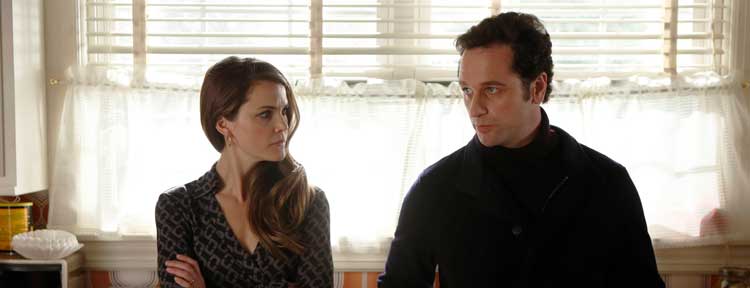
Kit Kittredge appears to be a story about a girl becoming a newspaper reporter, but what it’s really about is the torrid ‘Merican relationship between family and money. There is a really dark joke at the heart of ‘Merican families. It’s in both these true things:
- The best way to get through a time when you have no money is with family.
- The most likely way to destroy a family is to have no money and no job.
Kit Kittredge takes this whipsaw and adds another:
- Families of choice, expanded beyond our blood relatives, help people survive and rise out of poverty.
- Restoring our biological families of blood relatives is a great reward of surviving and rising out of poverty.
Should we dispense with blood relatives, seeing all the world as our family, and helping them with whatever little we have, like Rose of Sharon Joad feeding the starving stranger?
Can we bear the pain of losing our biological families or seeing them suffer? If making money makes that go away, isn’t making money a wonderfully redemptive thing?
These two goals conflict a great deal, and Kit Kittredge does a lot of dancing around to balance both, helped by the fact that the protagonist is a girl still growing into herself, with the freedom to learn and change what she wants and cares about. She can go from sharing Thanksgiving dinner with the hobo village as her new family to really truly happy to see her dad, and can go from outrage at the way capitalists treat the unemployed to joy that the capitalists give her money for work.
And she can do it because she is becoming.

So it’s a question of coming into your family role fully, but feeling like your life and self are a little left behind, versus coming into your family role partially, as you come into your adult life partially, mediated by the limits placed on you and your family by economic circumstances. Like so many stories of temporary separation threatening permanent family dissolution, it is driven first of all by the mobility of the ‘Merican workforce, which seems both an opportunity and an undue burden.
And if that were all it was, it would be too close to call.
But on top of these complex ideas of family and economy, weaving back and forth between socialism and capitalism (which The Americans also does), note the little girl in the trailer dressed like a boy.
That is Willow Smith, daughter of Will and Jada Pinkett Smith. Having the daughter of Hollywood royalty get the role of a didactic traveling hobo child because of her industry connections is tremendously ‘Merican!
And another surprising ‘Merical feeling was the meta-casting of Chris O’Donnell as the absent father. Unless we watched certain specific TV shows, we missed Chris O’Donnell for most of the 2000s. And when he came back to the movie, wasn’t it sort of like a member of the family had come back? That big ‘Merican family of people you’ve never met who sometimes fight crime with L.L. Cool J?
That we can get this deep without even going into the dolls and everything bound up in that whole multimedia entertainment sub-industry (and ‘Merican Nuclear Sister loves those dolls) tells me the decision is made.
Winner: Kit Kittredge: An American Girl
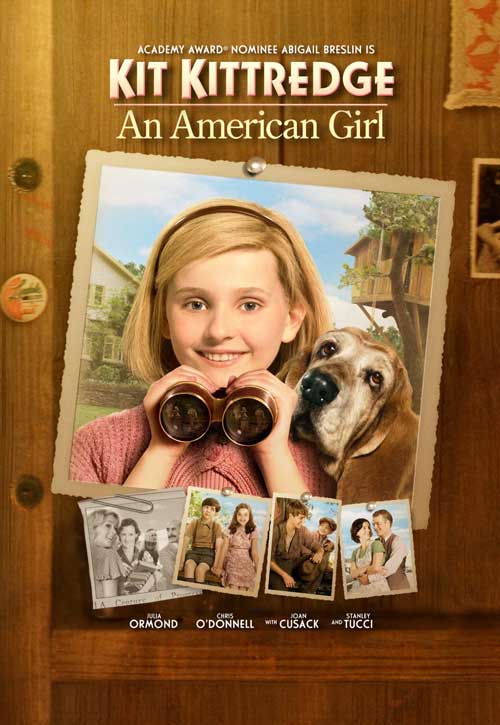
The Brother’s Match: American Dad! vs American Pastoral
The ‘Merican Nuclear Brother is expected to do nothing.
That is not to say he does nothing; he may do quite a bit. It’s just that, specifically, his choices don’t matter to anyone else. Without the danger of incumbent womanhood, which must be prepared for, ‘Merican Nuclear Brother can mostly do what he wants for the next (inaudible) years.
The family may hate him for it, they may accept him for it, they may adore him for it. However you slice it, it will be fair to no one, not him, not anyone else in the family.
Our last two nuclear family contenders take this idea in separate ‘Merican directions.
First, there’s American Dad!, an absurdist sitcom about toxic masculinity and flamboyant government incompetence launched by the Family Guy creative team not long after the Abu Ghraib prison abuse scandal. While the huge-jawed hometown fella offers easy symbolism, the show’s subject matter, like any good ‘Merican Nuclear Brother, has not shown much adherence to its high concept.
Then, there’s the Pulitzer Prize-winning Philip Roth novel American Pastoral, a tale of Jewish-American family identity against the backdrop of the social upheavals of the Vietnam war, which was almost shot down out of the gates by ‘Merican Brother for being a book (the movie comes out next month and didn’t make the contest).

Dad! is infused with a youthful, ‘Merican spirit of zero responsibility. It can try any joke, any aside, any reference, and there’s no real possibility of negative consequence. There’s enjoyment, a lark, and it passes. Its characters’ familial obligations to each other are fluid and serve whatever joke happens to be handy.
Here, watch this. It’s about ‘Merican boys with families, for the most part. None of it matters:
Pastoral, on the other hand, crushes with the pointlessness of excellent young men. However tall, handsome, strong or fast they are, they solve nothing. The world moves on without them. In the ‘Merican spirit of the 60s (once subversive, now retro-orthodox), everyone has their own lives, public and private. They may maintain their privilege, but their control is illusory.

So which is more ‘Merican, the ‘Merican boy who aspires to nothing, but sometimes gets the world to smile, or the ‘Merica boy who aspires to a whole lot, but ends up doing virtually nothing and understanding less?
Well, the ‘Merican Nuclear Brother can’t be bothered to make this decision. Maybe he’s playing Titanfall 2, if that’s out yet when you finally get around to reading this. Or maybe he’s working an internship at SpaceX. Or making another parkour video. It hardly matters. Wherever he is, he’s probably vaping. I can even spell it V4P3, I guess, under the circumstances.
As such, this decision will be made by the final member of the ‘Merican nuclear family. Here, boy!!!
::Lifts up book::
::Silence::
::Puts down book::
::Turns on TV::
“ARF!! ARF ARF WOOF ARF!! WOOF! BARK!”
Now that’s what the ‘Merican nuclear family is all about!
Winner: American Dad!
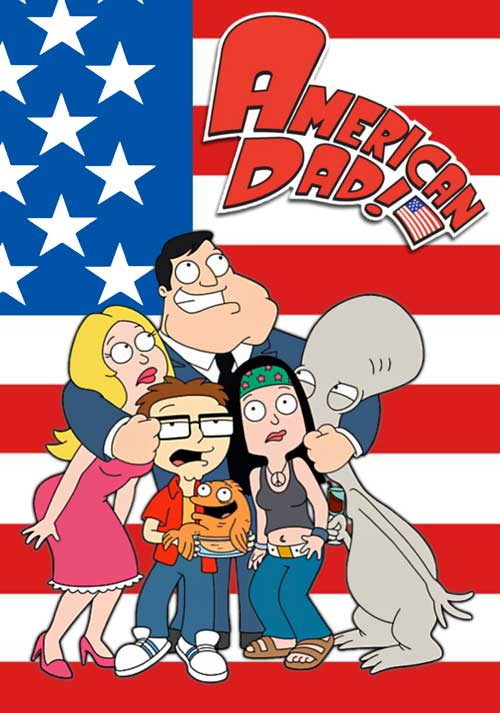
Here’s how the bracket looks like after Round 1.
Next week, it all comes down to cold hard cash.
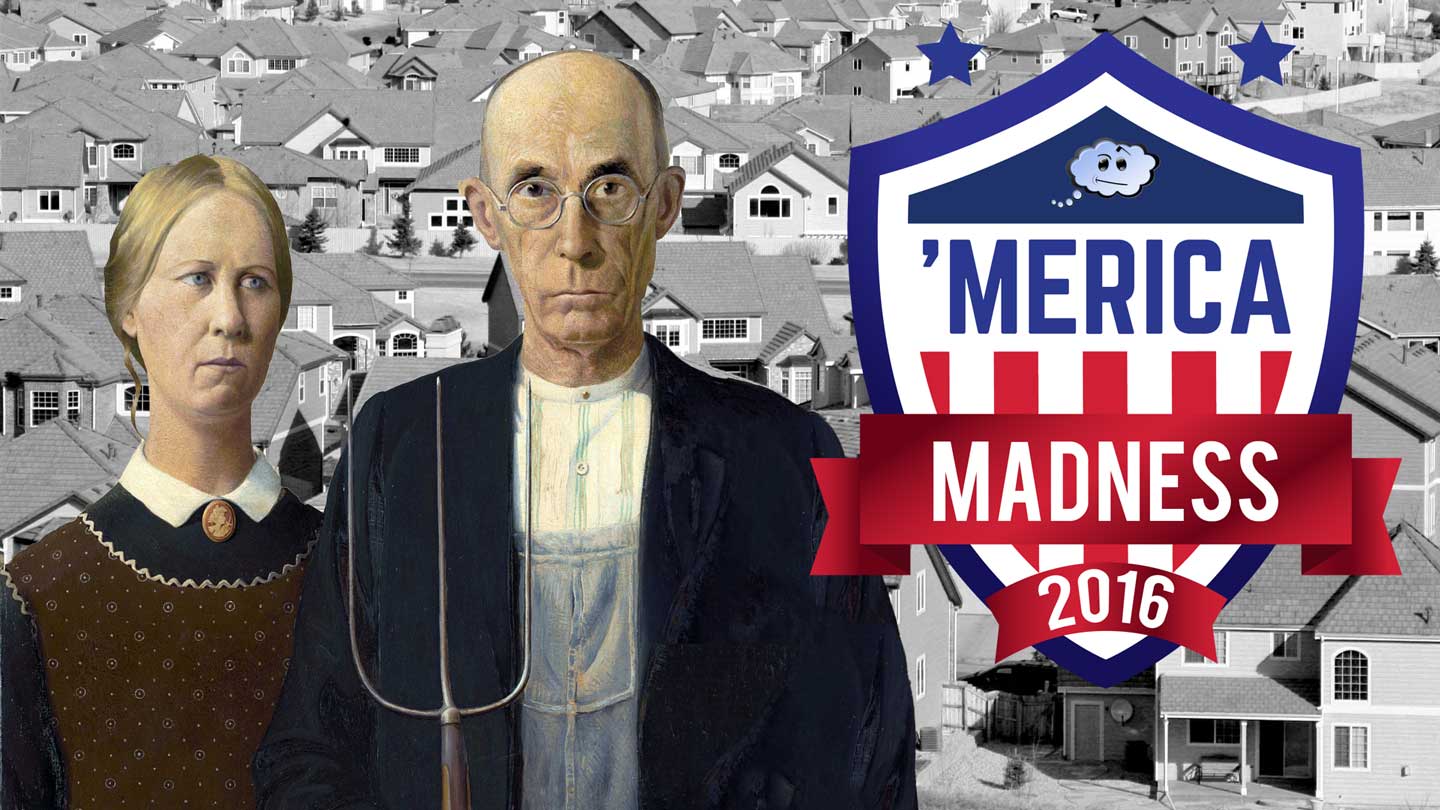
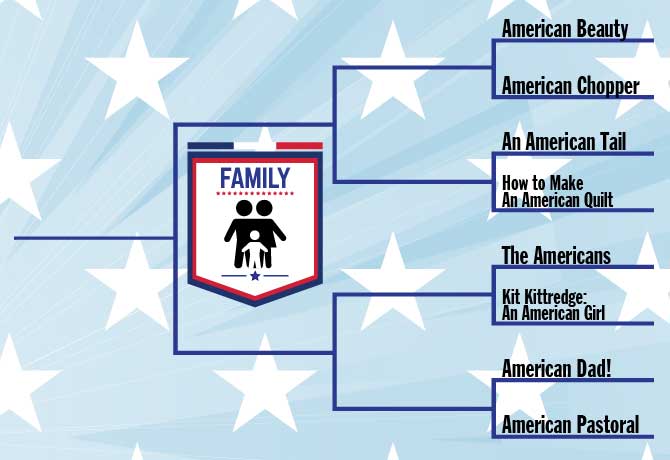
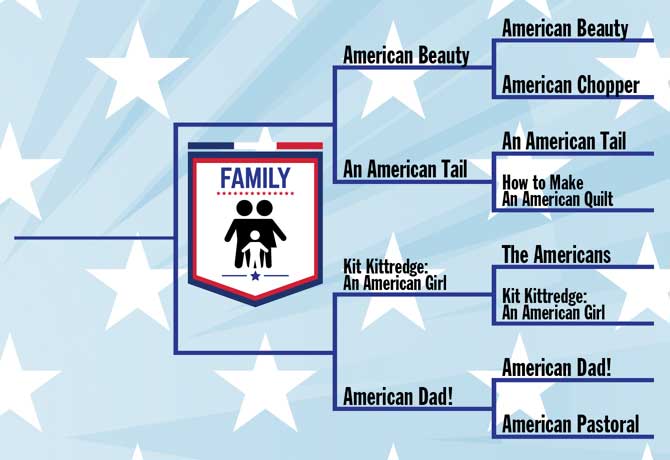
Add a Comment